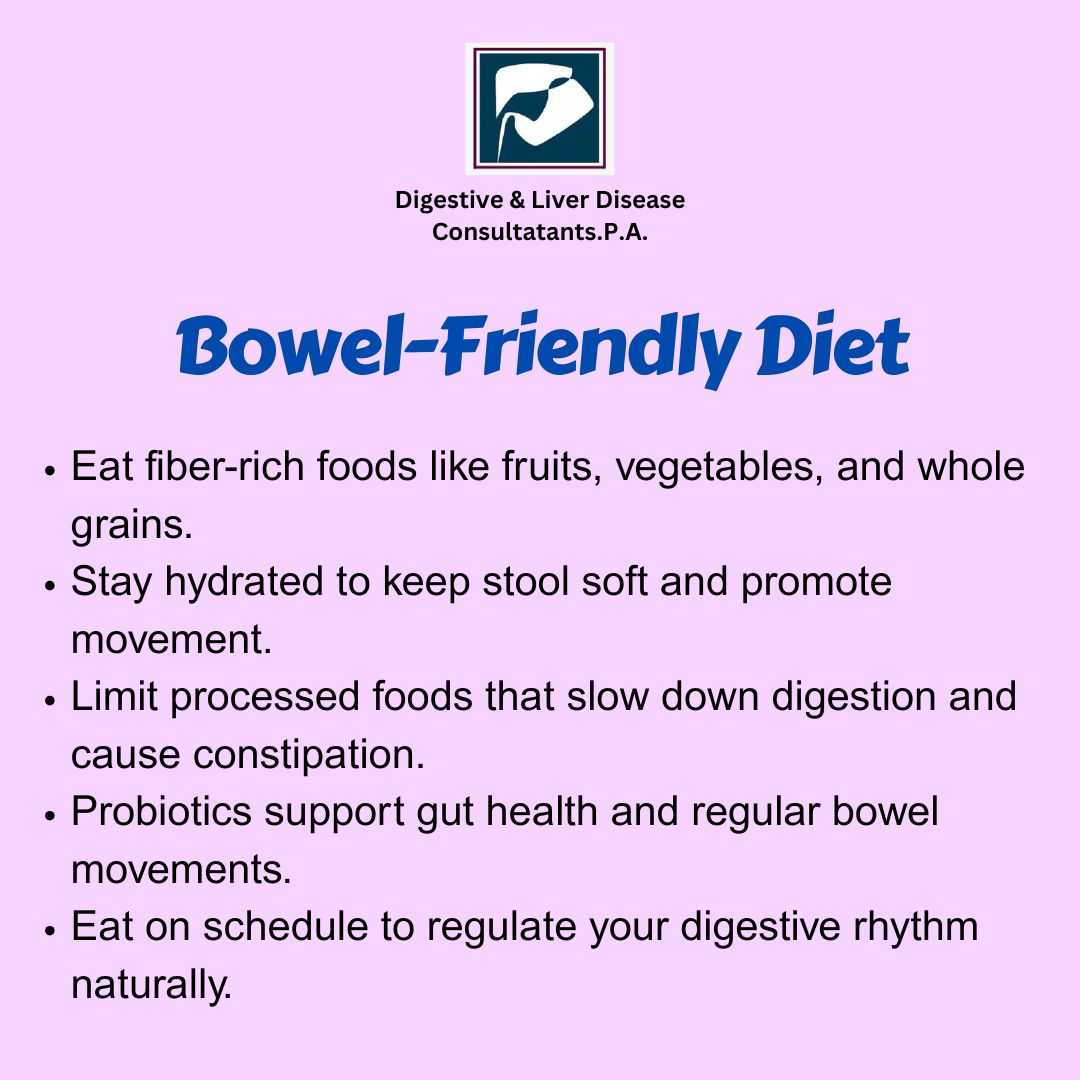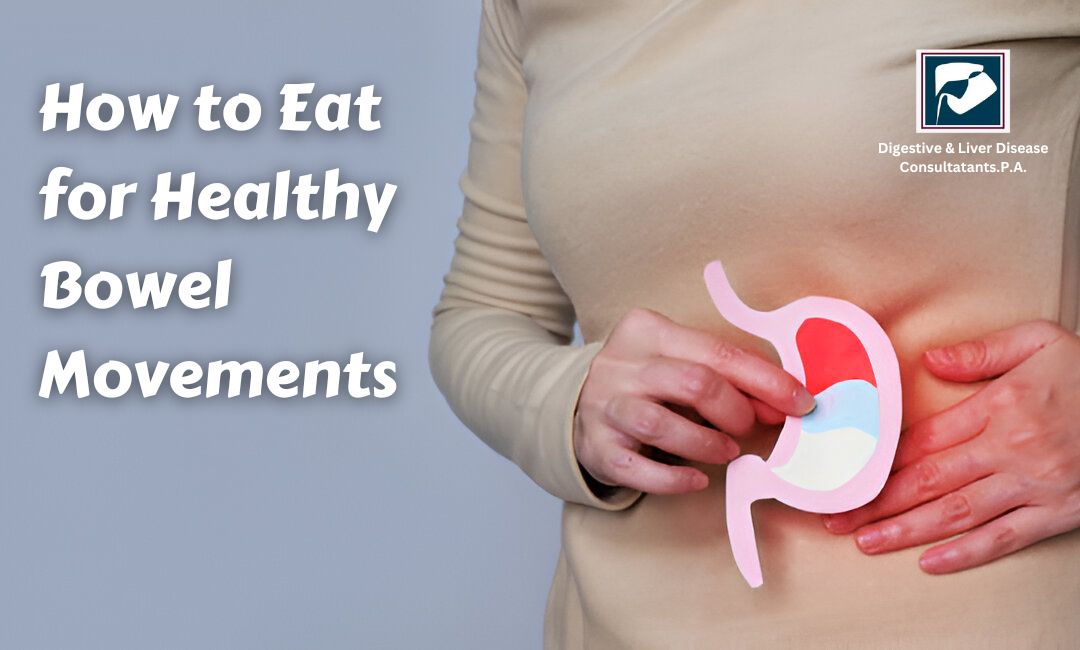Good bowel movements are a sign of a healthy digestive system. When things are working as they should, you feel lighter, more energetic, and less bloated. But when bowel habits are off—whether you’re constipated, going too often, or experiencing discomfort—it can make everyday life more difficult.
At Digestive & Liver Disease Consultants, P.A., we help patients manage and improve their digestive health every day. One of the simplest and most effective ways to promote healthy bowel movements is through diet. In this blog, we’ll guide you on how to eat for better digestion and regular, comfortable bowel movements.
Why Bowel Movements Matter
Bowel movements are your body’s natural way of removing waste and toxins. When your digestion is healthy, you should have one to three easy-to-pass bowel movements a day. Irregular bowel movements can lead to problems like:
- Constipation (fewer than 3 bowel movements per week)
- Diarrhea (frequent, loose stools)
- Bloating and gas
- Straining and discomfort
Improving your diet is often the first step in getting your gut back on track.

1. Eat More Fiber
Fiber is the superstar nutrient when it comes to healthy digestion. It adds bulk to your stool, helps it hold water, and keeps things moving through your intestines.
There are two types of fiber:
- Soluble fiber: dissolves in water and forms a gel-like substance. It helps soften stool and slows digestion. Good sources include oats, apples, bananas, beans, and chia seeds.
- Insoluble fiber: does not dissolve in water. It adds bulk and helps food move through your digestive system. Good sources include whole grains, nuts, carrots, and leafy greens.
Tips:
- Aim for 25 to 35 grams of fiber per day.
- Add fiber slowly to your diet to avoid gas or cramping.
- Pair fiber with plenty of water.
2. Stay Hydrated
Water is just as important as fiber. Without enough fluid, fiber can’t do its job. Water helps soften stool, making it easier to pass.
Tips:
- Drink at least 8–10 glasses of water daily.
- Carry a water bottle to sip throughout the day.
- Limit sugary drinks, alcohol, and caffeine, which can dehydrate you.
3. Include Healthy Fats
Healthy fats can help ease the movement of stool through your gut. They stimulate the release of bile, which helps break down fats and lubricate the digestive tract.
Foods with healthy fats:
- Avocados
- Olive oil
- Nuts and seeds
- Fatty fish like salmon or sardines
Just be sure not to overdo it, as too much fat—especially fried or processed foods—can slow digestion or cause discomfort.
4. Eat Regular Meals
Eating at regular times every day can help your digestive system work better. Your gut works on a schedule, and having consistent meal times helps it know when to get moving.
Tips:
- Don’t skip meals.
- Eat breakfast—it jumpstarts your digestive system.
- Try eating smaller meals more often if large meals upset your stomach.
5. Add Probiotics and Prebiotics
Your gut is home to trillions of bacteria that help with digestion. Keeping this bacteria balanced is key to healthy bowel movements.
Probiotics are “good” bacteria that support a healthy gut. You can find them in:
- Yogurt
- Kefir
- Sauerkraut
- Kimchi
- Miso
Prebiotics are fibers that feed your good bacteria. You can find them in:
- Garlic
- Onions
- Bananas
- Asparagus
- Oats
Together, probiotics and prebiotics help keep your digestion smooth and regular.
6. Limit Constipation-Causing Foods
Some foods can slow down your digestion and make constipation worse.
Watch out for:
- Processed foods (like chips, frozen dinners, and white bread)
- Excessive dairy (especially cheese)
- Red meat
- Fried and greasy foods
These foods lack fiber and are often harder for your body to break down.
7. Drink Warm Liquids in the Morning
Starting your day with a warm glass of water, herbal tea, or even warm lemon water can help “wake up” your digestive system and get things moving.
Tip: Try sipping warm liquids 15–30 minutes before breakfast to help stimulate bowel activity.
8. Watch Portion Sizes
Overeating can overwhelm your digestive system and slow everything down. Large meals can lead to bloating, gas, and discomfort.
Tips:
- Eat slowly and chew thoroughly.
- Stop when you feel about 80% full.
- Avoid lying down right after meals.
9. Listen to Your Body
If you feel the urge to go to the bathroom—don’t ignore it. Delaying bowel movements can make constipation worse and lead to straining.
Also, pay attention to how your body reacts to different foods. Keeping a food and bowel journal can help you spot patterns and avoid triggers.
When to See a Doctor
Sometimes, changes in diet aren’t enough. If you’re experiencing:
- Chronic constipation or diarrhea
- Blood in your stool
- Severe abdominal pain
- Unexpected weight loss
…then it’s time to consult a gastroenterologist.
About Digestive & Liver Disease Consultants, P.A.
At Digestive & Liver Disease Consultants, P.A., we are committed to improving your digestive health with expert care and personalized treatment plans. With a team of experienced gastroenterologists and advanced diagnostic tools, we treat a wide range of conditions including IBS, chronic constipation, diarrhea, hemorrhoids, and more.
Our mission is to help you feel better, faster—so you can get back to enjoying life with confidence in your gut health.
Conclusion
Healthy bowel movements are not just about comfort—they’re a key part of your overall health. With the right diet and habits, you can support your digestive system and feel your best every day. Focus on fiber, hydration, balanced meals, and gut-friendly foods to keep things moving smoothly.
Struggling with constipation or digestive issues? Contact Digestive & Liver Disease Consultants, P.A. today. Our experts will help find the cause and create a plan for better gut health—step by step.






